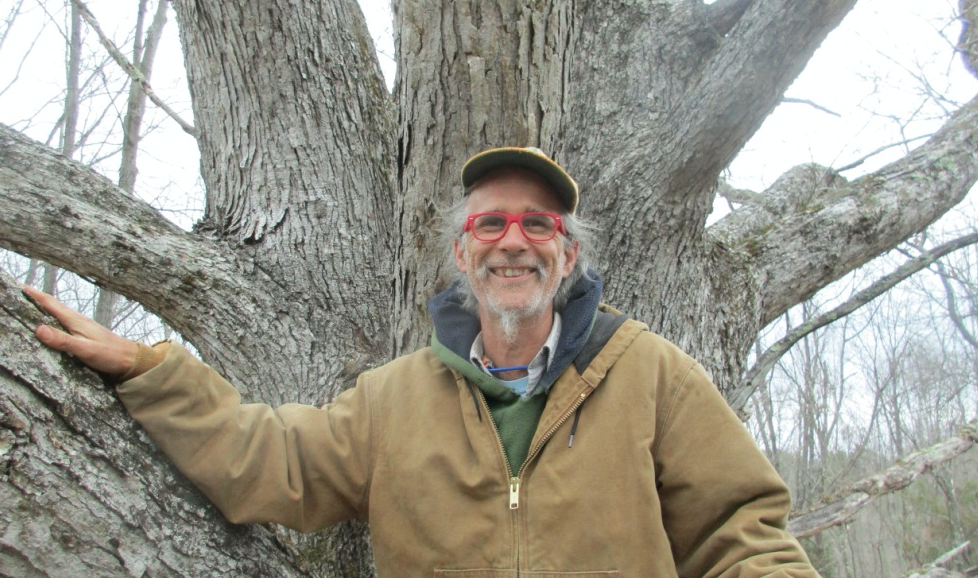Asheville boasts more than its fair share of unconventional eats. But many diners may not have considered one food that’s as local as your own backyard: the acorn.
Bill Whipple, founder of the Buncombe Fruit and Nut Club and a co-owner of Asheville’s Nutty Buddy Collective, a nut-focused agricultural business, hopes to endear Asheville to the idea of using acorns as a food source through his Acornucopia Project. The vision of Acornucopia is to create what Whipple calls “nut depots” in communities throughout Western North Carolina and beyond that will offer processing facilities with machinery for cracking and dehulling nuts and pressing and grinding the meats for oil and flour.
The aim is to encourage citizens to forage for edible nuts in their backyards, in parks and in other man-made environments, then either sell their harvest to Acornucopia depots for a profit or barter for finished products: flour and oil. And Whipple believes that compared with other types of nuts, acorns have enormous untapped potential as a sustainable local edible because they are abundant in Western North Carolina and can be processed into both flour and oil.
The flour, he says, can be easily substituted for standard wheat flour and acorn oil for standard olive, canola or coconut oils or butter. Acorn flour is not only gluten-free, but also has high nutritional content and offers a nutty flavor that is more substantial and complex than wheat flour.
Wildly nutritious
Local wild foods expert Alan Muskat of No Taste Like Home agrees that acorns are an overlooked source of nutrition. “I find certain acorns, properly prepared, to be one of the most delicious wild flavors I know,” he says. “It’s surprising, then, despite the recent foraging movement, how little attention I’ve seen given to them. Perhaps they are so common as to be invisible, but even pine is often used.”
However, Whipple and Muskat aren’t the only folks in Western North Carolina who have discovered the culinary usefulness of the acorn. Glorious Forest Farm in Madison County markets acorn flour as well as cookies made from it on its website and at the North Asheville Tailgate Market. Acorns have even moseyed into the beer world, appearing in Zebulon Artisan Ales 2016 Weaverville Winter Saison.
Historically, acorns were integral to indigenous North American diets and were also a staple food in ancient times in places such as Greece and Japan. European acorns, unlike their American cousins, are sweet and can be roasted directly after harvest like chestnuts. However, after undergoing a leaching process where the nut meats are soaked, rinsed and resoaked many times in water until all bitterness is gone, American acorns also achieve a sweet, nutty and complex flavor.
White oak acorns, which have a high carbohydrate composition, are ideal for producing acorn flour. Red oaks, on the other hand, feature higher protein content, and are therefore ideal for producing acorn oil. Whipple says that white oak acorns should be gathered in the fall, as they are more ephemeral and vulnerable to mold. Red oak acorns are hardier and should be gathered in the spring.
Open-source food
Acorns are plentiful, easy to gather, don’t require intensive agricultural investment and, once stabilized by leaching and drying, store well. So why aren’t they an American dietary staple?
“We are trained to think that things from nature are poisonous,” Whipple says. Big agriculture, which is responsible for the production of major American monocrops like wheat, corn and soy, is sustained by the perpetuation of this idea, he says. The industry trains consumers to believe that “we have to rely on big corporations and grocery stores for food,” which, says Whipple, is far from the truth.
As an open-source food, he continues, acorns fly in the face of big agriculture because they belong to no one. The Acornucopia Project is “something we own, like Airbnb or Uber,” he says. “When we realize this, we have freedom. We have ease in our life.”
The Nutty Buddy Collective is working to reinstate a diversity of fruit and nut trees throughout the Asheville region by partnering with conservation-minded landowners, establishing and maintaining longterm plantings of native and well-adapted nuts and through a variety of other initiatives. The Acornucopia Project, Whipple hopes, will serve to further strengthen the local Asheville economy, create greater food sovereignty in the area and lessen our dependence on big agriculture.
Environmental concerns
Whipple hopes that as his “centralized nuttery” idea spreads, he will eventually be able to establish biologically diverse oak orchards. He realizes that folks may have concerns about the environmental sustainability of harvesting acorns. But while harvesting by humans might have a small impact on food supplies for some animals, it would predominantly be done in manmade environments rather than in endangered wildlife habitats.
Whipple also urges us to consider acorn consumption within a larger environmental framework: Whereas conventional agriculture demands that forests be clear-cut to make space for annual monocrops, acorns are long-lasting perennials. Corporate monocrops can also require other destructive land practices such as intensive pesticide and fertilizer use, but acorns only need to be harvested.
An investment in acorns is therefore a divestment from an environmentally destructive industry. “The more we eat acorns means the less we eat commodity grains,” he says. “Where we put our resources is the world we create.”
And Muskat adds that it doesn’t hurt that with their little caps, they are an aesthetically pleasing nut. “After all,” he says, “there’s something so helplessly cute about them.”
To find out more about Bill Whipple’s work, visit nuttybuddycollective.com and acornucopiaproject.com. For details on Alan Muskat’s wild food tours and classes at No Taste Like Home, visit notastelikehome.org.



Wonderful. In 2013, I proposed a similar local industry for black walnuts (http://notastelikehome.org/BlackWalnuts.php), and here’s an article on home use (http://notastelikehome.org/articles/not-available-in-stores/). My book Coming Home, free online, is all about the larger issues mentioned here (http://notastelikehome.org/articles/coming-home/). A nut so nutty idea!